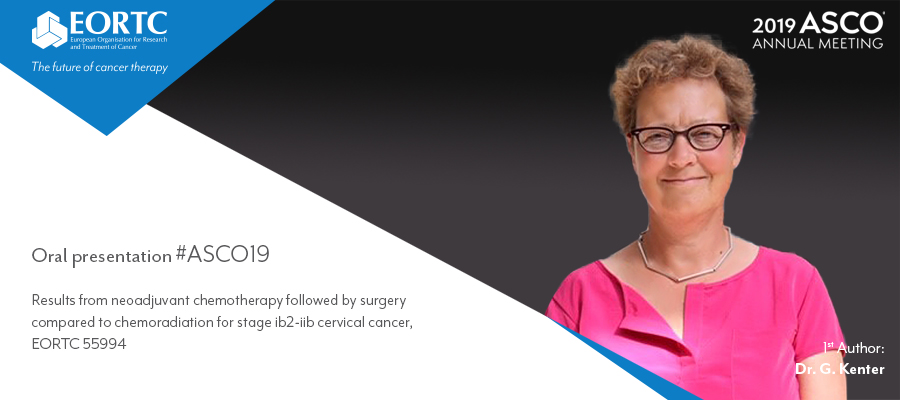Defining the best treatment for locally advanced cervical cancer
3 Jun 2019
Chicago, USA: Locally advanced cervical carcinoma (where the cancer has spread from the neck of the womb to nearby tissue) is treated either by radiotherapy given concurrently with chemotherapy (RTCT), or by neo-adjuvant (upfront) chemotherapy followed by surgery (NACTS). There is conflicting evidence on the best treatment, so, in an attempt to identify which was the most effective therapy for Stage IB2-IIB cervical cancer, the European Organisation for Research and Treatment of Cancer (EORTC) set up an international trial, the results of which are reported today (Monday 3 June) at the American Society of Clinical Oncology (ASCO) Annual Meeting.
Dr Gemma Kenter, from the Centre for Gynaelogical Oncology, Amsterdam, The Netherlands will describe the design and outcome of the randomised controlled trial, which involved researchers from ten European countries and which recruited over 600 patients with stage IB2-IIB cervical carcinoma. The trial ran between May 2002 and June 2014. Chemotherapy followed by hysterectomy was given to 311 patients, and 309 received concomitant radiotherapy and chemotherapy without surgery. Analysis of the 12 year period, with a median follow-up time of eight years, showed that overall survival was the same between the two groups.
“The overall survival at five years is not different between the two treatment arms, while the progression-free survival appears to be slightly longer after RTCT, although such a difference disappears when only the patients completing treatment are considered,” says Dr Kenter. “There is a trend for a better outcome after NACTS for Stage IB2, and after RTCT for Stage IIB and patients for aged over 50. Treatment related morbidity and quality of life need further analyses, but data presently available show a higher short-term toxicity for NACTS option, while toxicity is higher in the long term for the RTCT group.”
Cervical cancer is increasingly rare in Western industrialised cancers due to secondary prevention and, more recently, vaccination. However, it is still frequent in developing areas of the world, and among low-income immigrants elsewhere. “Unfortunately it is often diagnosed at an advanced stage among these women and, even if not, they are less likely to have access to vaccination or to the complex treatments we have studied in our trial,” says Dr Kenter.
Although the trial results are not practice-changing as yet, the researchers believe that further analysis of the quality of life data may well show a more significant difference between the two groups. “Our results are substantially in agreement with those generated by another randomised trial run in one centre in India, and published last year. We plan to further analyse data from both trials in the hope that this will provide more evidence for the best personalised treatment of locally advanced cervical cancer,” Dr Kenter will conclude.
“These results show that neoadjuvant chemotherapy followed by surgery for cervical cancer stage IB2 to IIB, results in similar survival, but less long term toxicity compared to chemo-radiotherapy. This is an important finding for the quality of life of these women,” said Professor Nelleke Ottevanger, Chair of the EORTC Gynaeological Cancer Group.
Abstract #262775
Results from neoadjuvant chemotherapy followed by surgery compared to chemoradiation for stage Ib2-IIb cervical cancer, EORTC 55994.
The research was funded by the EORTC.
Related News
Meet the new EORTC Board
9 Jul 2024
We are pleased to announce the release of the EORTC 2023 Annual Report
17 Jun 2024
Dr Denis Lacombe, EORTC CEO, appointed stakeholder co-chair of ACT EU advisory group
24 May 2024
Clinical Trials Day 2024: a Q&A on pragmatic clinical trials
20 May 2024
EORTC/EMA workshop suggests an international way forward for treatment optimisation studies
8 May 2024
EORTC’s Participation at the ESTRO Congress 2024
29 Apr 2024
EORTC: Advancing research and treatment for rare cancers
29 Feb 2024
EORTC Fellowship Programme: celebrating more than 20 years of impactful collaboration
22 Feb 2024
Appointment of Malte Peters as EORTC Strategic Alliance Officer
9 Feb 2024
Unique series of workshops in partnership with the European Medicines Agency (EMA)
7 Feb 2024


